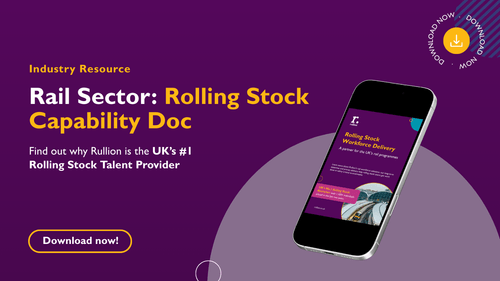National Insurance Changes in 2025: What Jobseekers Need to Know
From April 2025, important changes to National Insurance (NI) contributions came into effect across the UK, shaping how employers manage costs and plan their workforce. Even though NI doesn’t reduce take-home pay, these changes shape which roles employers fund and how fast they hire. While these updates impact businesses directly, they can also influence how and when job opportunities are created (especially in sectors like critical infrastructure, where demand remains high).
To help prepare, we spoke with Gareth Smith, Client Services Manager at Rullion, who shares his expert view on what these shifts mean for the job market and how jobseekers can stay ahead.
What’s Changed?
Two key changes were introduced in April:
-
Employer National Insurance contributions increased from 13.8% to 15%
-
The earnings threshold for employer contributions dropped from £9,100 to £5,000
While these changes don’t directly affect your take-home pay, they do impact how companies' budget for new hires.
“It won’t directly change what jobseekers take home,” Gareth explains, “but it will affect how businesses plan and manage their hiring budgets.”
How This Could Impact You
Short-Term: More Careful Planning Around Hiring
According to Gareth, the immediate effect could be a slightly more cautious approach to recruitment as organisations adjust their budgets.
“It could probably lead to slower hiring,” he says. “So roles being signed off a little bit slower... seeing how they can operate with reduced headcount.”
This doesn’t mean fewer opportunities, it simply means employers may take more time to assess their needs before creating or approving roles. This places greater importance on making your application stand out.
Long-Term: Flexibility and Contract Roles on the Rise
Gareth expects a gradual shift towards contract and project-based roles as businesses look for flexible ways to manage workforce costs.
“Businesses may prefer bringing people in on temporary contracts or project-based roles... because they will know exactly how much that is costing over a certain period of time.”
These roles offer employers more control, while giving jobseekers the chance to work across different projects, companies, and sectors, especially in fast-paced industries like energy, utilities, and transport.
Three Ways to Stay Competitive
1. Upskill with digital, project-management or technical training.
Gareth believes that self-development will be even more important in the months ahead.
“There always should be an emphasis on candidates and people upskilling themselves,” he says. “But I think there will be more of an emphasis on this in areas with high demand - digital tools, project managing, emerging technologies.”
He also suggests taking advantage of free seminars, webinars, and training programmes that can add practical value to your application.
“If somebody is applying for a role… I’d be looking at what is the next step for me,” he says. “Could I be doing an electrical engineering discipline or qualification in the background?”
Even if you’re in work now, small steps toward certifications or cross-skilling can pay off in future opportunities.
2. Plan your next assignment before your current one ends.
Contract roles shouldn’t be seen as stopgaps. Gareth encourages thinking several steps ahead.
“Not waiting until the assignment is coming to an end... start planning ahead... what if I get a project for eight months or an assignment for eight months, what can I do after that?”
This mindset helps build momentum and avoids gaps between roles, especially if you're working on temporary or fixed-term assignments.
3. Network on LinkedIn, at fairs, and via referrals.
LinkedIn, job fairs, and referral networks all remain powerful tools. Gareth notes that sometimes the best approach is going “old school” and picking up the phone. Many of the best placements come from a simple conversation or introduction.
“We do it a lot within my team - a lot of referral candidates. Somebody will ring us and say, ‘I’ve got a friend I work with [on another project], have you got any roles coming up?’”
Whether it’s a past colleague, industry contact, or recruiter, those conversations often lead to opportunities you might not find on job boards.
Why This Could Be a Positive Shift
Change can feel uncertain, but for jobseekers, this moment offers a chance to take control of your career path. The rise in employer NI contributions means businesses are valuing flexibility, prioritising key skills, and investing in those who can grow with them.
Rullion continues to support jobseekers at every stage; from first-time placements to long-term career growth across the critical infrastructure sector.
“If your assignment is coming to an end in a month... can we support them into their next role with our different customers?” he adds. “That’s what we’re always thinking about.”
Take the Next Step in Your Career
The job market is evolving, but with the right mindset, skills, and support, this could be the perfect time to grow your career.
Whether you're looking for a short-term contract, a long-term project, a full-time role, or a new direction in your industry, we're here to help you unlock your potential.
Explore jobs built for your next move: https://www.rullion.co.uk/jobs/
--
Watch the full interview below:
In this video, Gareth explains how April 2025’s NI rate rise and threshold changes affect your job hunt.





